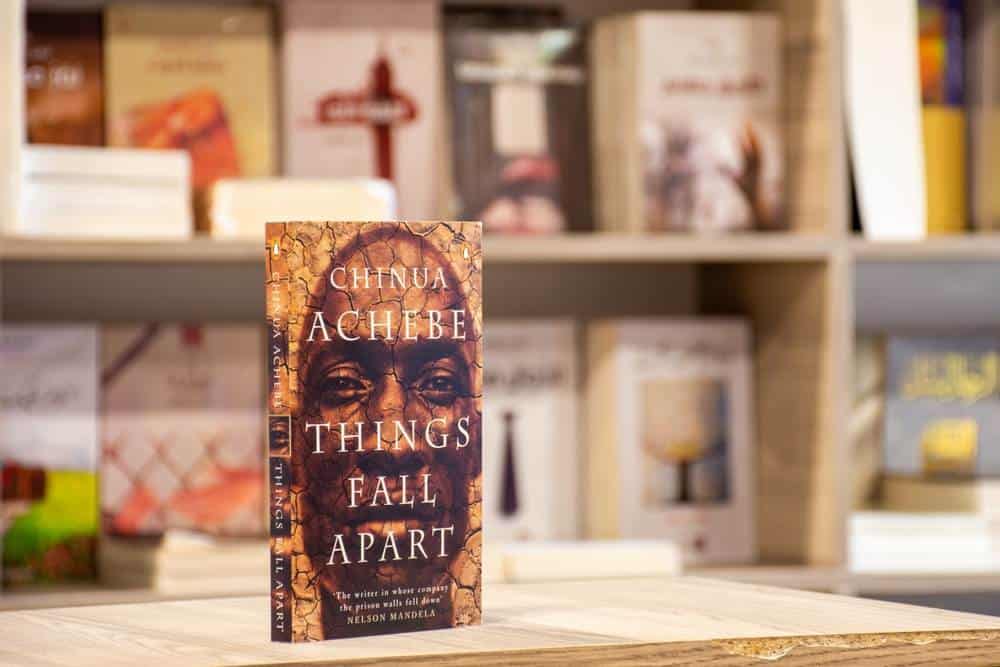In the vast literary landscape, few works have resonated with as much resonance as Chinua Achebe’s magnum opus, Things Fall Apart. This seminal novel, lauded for its poignant prose and profound storytelling, has become an enduring testament to the importance of cultural and historical narratives.
But do you ever wonder what makes Achebe’s Things Fall Apart important?
With a narrative that transcends time and borders, Achebe sheds light on the complexities of colonialism, the clash of traditions, and the indomitable spirit of a people.
As we delve into the significance of Achebe’s Things Fall Apart, we unravel the layers of meaning woven into its pages, revealing a seminal work that has not only stood the test of time but continues to provoke introspection and ignite conversations on the most fundamental aspects of humanity.
1. Introduction: Setting the Context for Achebe’s Things Fall Apart

At the epicenter of African literature lies a novel that has not only stirred readers across the globe but also fundamentally reshaped the landscape of African storytelling. This is none other than Chinua Achebe‘s masterpiece, Things Fall Apart.
Set in pre-colonial and colonial eastern Nigeria, the novel captures the twilight of independent African rule and the flourishing of their culture, as well as the impact of Western missionaries and imperialists on this culture.
Achebe’s work, published in 1958, has earned an indelible place in the African literary canon, receiving worldwide recognition due to its compelling narrative, intricate cultural depictions, and incisive critique of colonialism. It is considered the best-selling African novel, with over 20 million copies sold to date.
An Insider’s View of the African Experience
The power of Things Fall Apart lies not just in its captivating storytelling, but also in the unique perspective it offers. The narrative serves as an insider’s view of the African experience, providing a much-needed corrective to the one-dimensional and ultimately racist portrayals of traditional Africans by Western writers1.
By presenting the rich culture and complexities of the Igbo society through the eyes of Okonkwo, the novel’s protagonist, Achebe challenges the skewed representations of Africa prevalent in Western literature.
He expertly navigates themes such as colonization, family, religion, tradition, language, masculinity, and fate, all while depicting the erasure of culture through colonization.
In doing so, Achebe not only highlighted the richness of African culture but also opened a window into the historical context of the time, specifically the British occupation of Nigeria and its consequences. This immersive approach enabled Things Fall Apart to resonate with readers globally, heralding a new era in African literature.
2. The Cultural Significance of Things Fall Apart
In many ways, Chinua Achebe’s “Things Fall Apart” serves as a powerful agent for the promotion of African culture. The novel intricately weaves a tapestry of traditional African values, customs, and societal structures, providing readers with a vivid insight into the rich and diverse world of pre-colonial Africa.
This remarkable depiction of African culture, achieved through Achebe’s masterful storytelling, sets the novel apart as an influential work in African literature.
A Depiction of Igbo Society
One of the most striking features of “Things Fall Apart” is the detailed depiction of the Igbo society. Achebe portrays this African community not as a simplistic or primitive entity, but as a complex and dynamic society with its own systems of justice, religious beliefs, and social norms.
This nuanced representation challenges Western depictions of Africa as a “formless area of life“. Instead, it presents Africa as a vibrant civilization with a rich cultural heritage and sophisticated social structures.
- Achebe’s narrative also captures the inherent tensions within the Igbo society, revealing the complexities of African traditional life. The protagonist,
- Okonkwo, often finds himself at odds with the societal norms, embodying the conflicts that can arise within such a tightly knit community.
- This portrayal adds depth to the novel, making it a compelling exploration of the human condition within a specific cultural context.
An Authentic Narrative
“Things Fall Apart” is considered an authentic narrative about life in Nigeria at the turn of the twentieth century for several reasons.
- Achebe’s evocative descriptions of traditional Igbo customs, from the ritualistic yam festivals to the practice of bride price, provide an intimate look into a way of life that was rapidly disappearing due to colonial influences.
- Moreover, the narrative stays grounded in historical events, such as the British occupation of Lagos and the subsequent expansion of their rule over Nigeria.
- The novel’s depiction of these events does not shy away from the harsh realities of colonialism, yet it manages to retain a focus on the resilient spirit of the Igbo people.
- By doing so, “Things Fall Apart” paints a picture of Nigeria that is both historically accurate and deeply resonant with the African experience.
In essence, the cultural significance of “Things Fall Apart” lies in its nuanced and respectful portrayal of African societies. Through Achebe’s skilled storytelling, the novel becomes a conduit for understanding and appreciating the richness of African culture.
It remains a seminal work in African literature, continuing to inspire and educate readers about the complexities of African societies and the profound impact of colonialism on these communities.
3. Things Fall Apart as a Critique of Colonialism
In Achebe’s ‘Things Fall Apart’, the portrayal of British colonialism and its impact on African societies is at the forefront of the narrative. The story unfolds in the late 19th century, in the Igbo society of Nigeria, during the onset of British colonization.
The protagonist, Okonkwo, symbolizes the traditional African society, jostling to retain its cultural identity amid the forceful imposition of Western values.
Achebe’s Portrayal of British Colonialism
The novel powerfully showcases the devastating effects of British colonialism on African societies, primarily through the character of Okonkwo. Okonkwo, a respected warrior in his village, represents the strength and resilience of the indigenous culture. However, his world begins to crumble with the arrival of European missionaries.
As a result, he finds himself in a battle against colonial values that threaten to erase his cultural identity. Okonkwo’s struggle and ultimate tragic end serve as a potent critique of the disruptive influence of colonialism.
The Narrative: A Tale of Lost Identity
‘Things Fall Apart’ serves as an allegorical tale about where things went wrong for Africans during the era of colonialism. The novel depicts the gradual disintegration of rich African traditions under the weight of European dominance.
This loss is symbolized by Okonkwo’s exile from his community, and his eventual despair and suicide. His inability to resist the changes imposed by the missionaries, and the loss of his son to their influence, underscore the destructive power of colonialism on individual lives and traditional societies.
Historical Context
The historical context of ‘Things Fall Apart’ is intertwined with the British occupation of Nigeria in the late 19th and early 20th century. Frustrated with the expanding slave trade, the British occupied Lagos, a major slave-trading post, in 1861 and subsequently took control of the rest of Nigeria.
This occupation was fueled not only by a desire to control the slave trade but also by competition over the natural wealth of West Africa. Over time, the British redefined the diverse ethnic groups of the region into one entity, Nigeria, declaring it a colony of the British Empire.
Such historical realities deeply inform the narrative of ‘Things Fall Apart’, illuminating the profound changes and challenges that came with colonial rule.
4. Achebe’s Literary Contributions and Legacy
Chinua Achebe stands as a towering figure in the world of literature, thanks to his unique storytelling technique and innovative prose style. His novel “Things Fall Apart” is a prime example, offering a masterclass in the craft of storytelling that’s so good it’s often considered a cornerstone of academic syllabi concerning the colonial experience.
Not only did he bring African culture to life through his vivid descriptions and authentic narrative, but he also elevated English prose with his use of Igbo idioms and proverbs, creating a unique blend that captivated readers worldwide.
Unique Storytelling Techniques
Achebe’s skillful weaving of traditional African oral storytelling techniques with Western literary forms gave his work a universal appeal. His ability to create complex characters and plots while maintaining the richness of his cultural heritage contributed significantly to his global recognition.
As Baba Gana Wakil, Nigerian Deputy Ambassador, noted during a symposium celebrating the 50th anniversary of “Things Fall Apart,” the fact that this literary work remains fresh and exciting half a century later is a testament to Achebe’s brilliance.
Shaping African Literature
Moreover, “Things Fall Apart” didn’t just put Achebe on the world literary map. It also played a pivotal role in shaping modern African literature. The novel became the archetypal modern African novel in English, read not just in Nigeria but throughout Africa. By writing an African story from an African perspective,
Achebe encouraged other African writers to tell their stories their way, inspiring a new wave of African literature.
In the words of Ellah Wakatama Allfrey, deputy editor of Granta, Achebe was a ‘big man’ defined not by greed, corruption, and hunger for power but by a generosity of spirit and imagination that changed the course of literature. His legacy continues to influence generations of African writers, reminding them of their right to tell their stories themselves.
In essence, Achebe’s “Things Fall Apart” is not just a book. It’s a literary revolution that transformed African literature and continues to resonate with readers and writers worldwide.
Its significance transcends time and geography, cementing its place in the global literary canon and affirming Achebe’s indelible imprint on the world of literature.
Frequently Asked Questions
What is the significance of Chinua Achebe’s ‘Things Fall Apart?”
Chinua Achebe’s ‘Things Fall Apart’ is a groundbreaking novel that explores the effects of European colonialism on traditional African society.
When was ‘Things Fall Apart’ published?
‘Things Fall Apart’ was first published in 1958.
What is the story set?
The story is set in pre-colonial Nigeria, primarily in the Igbo village of Umuofia.
Who is the main character in the novel?
The main character is Okonkwo, a respected warrior and wrestling champion in Umuofia.
What is the significance of the novel’s title?
The title, ‘Things Fall Apart,’ conveys the theme of the story—that the arrival of European colonialism and the disruption of traditional African culture leads to the disintegration and breakdown of society.
How does “Things Fall Apart” impact African Literature?
‘Things Fall Apart’ is widely considered one of the key texts in African literature. It played a pivotal role in portraying African perspectives, challenging stereotypes, and establishing a new canon of African literature.
Has “Things Fall Apart” been adapted in other forms of media?
Yes, ‘Things Fall Apart’ has been adapted into various forms, including stage plays, radio dramas, and television series.
What is the enduring legacy of “Things Fall Apart?”
The novel has become an influential and widely studied work, shedding light on the impact of colonialism and serving as a symbol of African resilience and cultural identity.
So What Makes Achebe’s Things Fall Apart Important?
In this journey into Achebe’s world, we have explored various facets of his seminal work, ‘Things Fall Apart’. From its profound cultural significance to its stinging critique of colonialism, and Achebe’s unique storytelling technique, each aspect underscores the magnitude of this novel in African literature.
The narrative offers a deep dive into the vibrant culture and intricate complexities of Igbo society, providing readers with an authentic portrayal of life in Nigeria at the turn of the twentieth century.
Achebe’s portrayal of British colonialism and its impact on African societies serves as a stark reminder of the historical injustices that took place during the British occupation of Nigeria.
Achebe’s unique storytelling technique and the prose style used in ‘Things Fall Apart’ significantly contributed to his worldwide recognition, cementing his legacy in the field of literature. His literary contributions have played an instrumental role in shaping modern African literature, making his works a must-read for anyone interested in African narratives and postcolonial studies.
As we wrap up this exploration, let us be reminded that ‘Things Fall Apart’ is more than just a novel – it is a cultural artifact, a historical chronicle, and a literary masterpiece.
We encourage you to delve deeper into ‘Things Fall Apart’ and other works by Achebe. There is much to learn, much to ponder upon, and much to appreciate in these narratives that continue to echo the voices of a continent often misunderstood and misrepresented.
The video below presents an interview with Chinua Achebe in which he also reads some sections from his novel ‘Things Fall Apart.’




